Exploring Social Approaches to Cancer & Public Health Agency Role
VerifiedAdded on 2023/03/31
|9
|2619
|97
Essay
AI Summary
This essay explores the multifaceted nature of cancer through a sociological lens, examining how social factors like class, gender, and ethnicity influence its incidence and prevalence. It discusses the role of public health agencies in reducing the disease's impact through early detection, awareness programs, and health promotion initiatives. The essay also contrasts theoretical perspectives, such as conflict theory and structural functionalism, to understand the causation of cancer and the inequalities in healthcare access. Ultimately, it highlights the importance of public health interventions in promoting health, changing behaviors, and improving cancer outcomes by improving awareness among the population. Desklib offers similar resources for students.
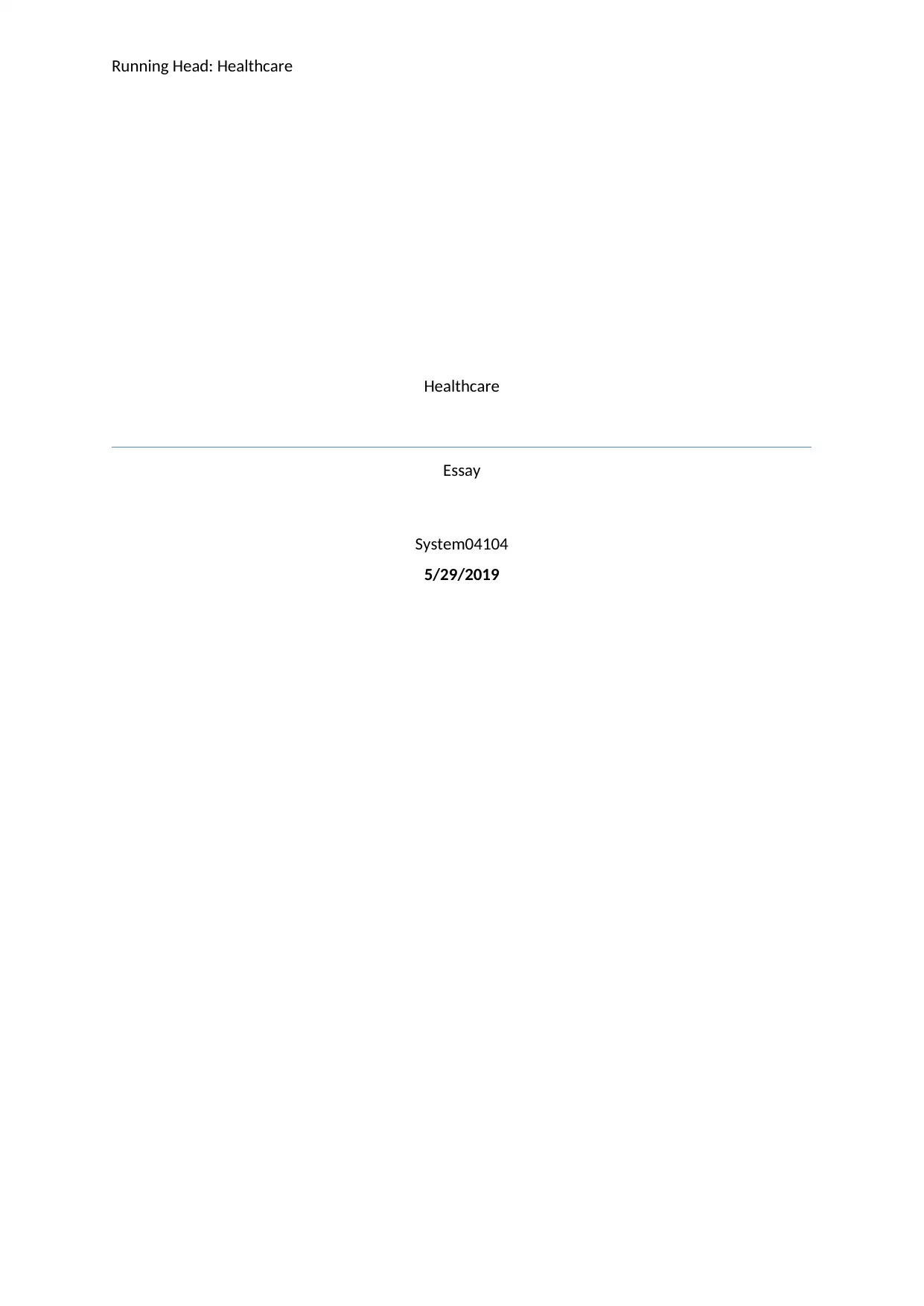
Running Head: Healthcare
Healthcare
Essay
System04104
5/29/2019
Healthcare
Essay
System04104
5/29/2019
Paraphrase This Document
Need a fresh take? Get an instant paraphrase of this document with our AI Paraphraser
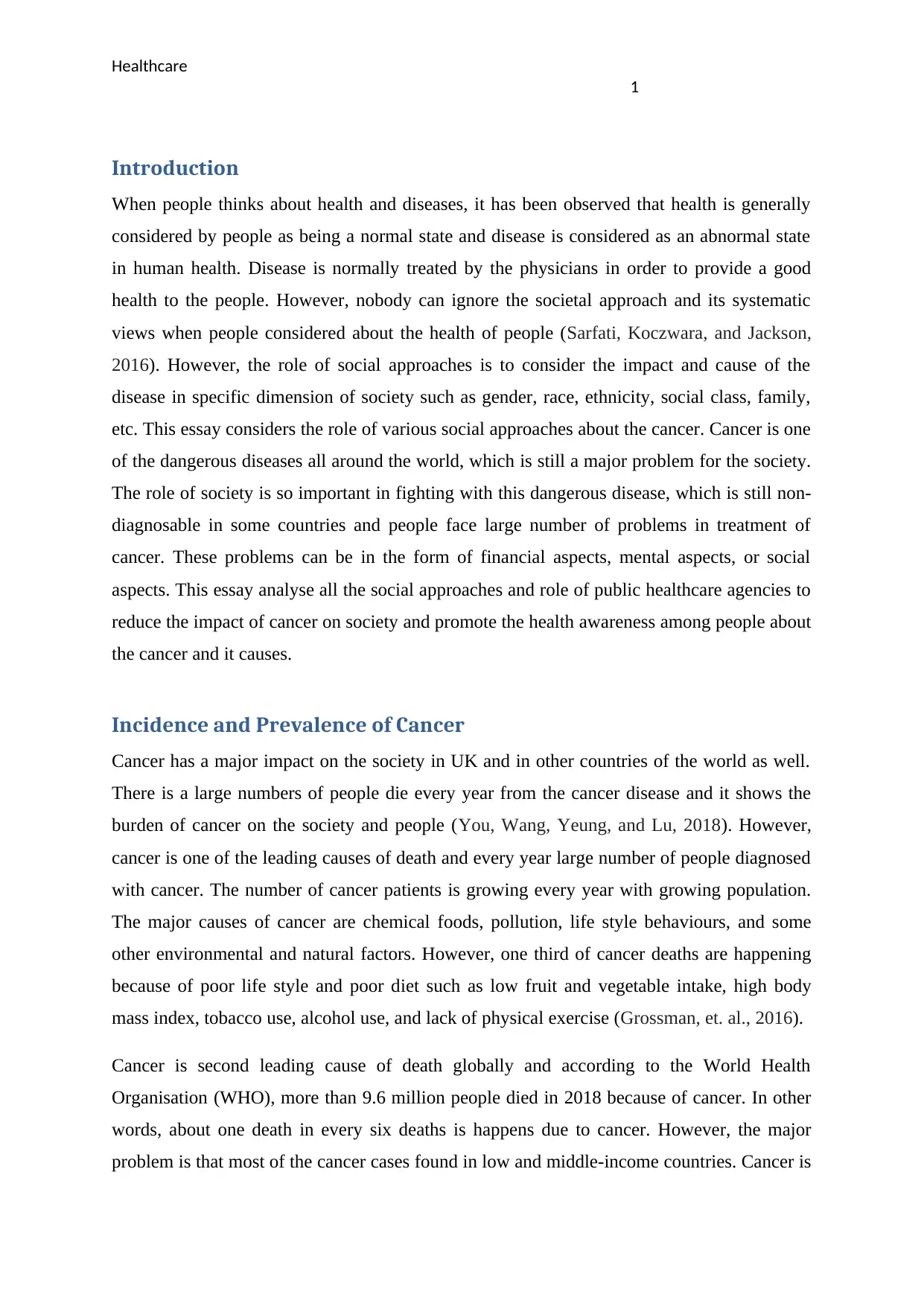
Healthcare
1
Introduction
When people thinks about health and diseases, it has been observed that health is generally
considered by people as being a normal state and disease is considered as an abnormal state
in human health. Disease is normally treated by the physicians in order to provide a good
health to the people. However, nobody can ignore the societal approach and its systematic
views when people considered about the health of people (Sarfati, Koczwara, and Jackson,
2016). However, the role of social approaches is to consider the impact and cause of the
disease in specific dimension of society such as gender, race, ethnicity, social class, family,
etc. This essay considers the role of various social approaches about the cancer. Cancer is one
of the dangerous diseases all around the world, which is still a major problem for the society.
The role of society is so important in fighting with this dangerous disease, which is still non-
diagnosable in some countries and people face large number of problems in treatment of
cancer. These problems can be in the form of financial aspects, mental aspects, or social
aspects. This essay analyse all the social approaches and role of public healthcare agencies to
reduce the impact of cancer on society and promote the health awareness among people about
the cancer and it causes.
Incidence and Prevalence of Cancer
Cancer has a major impact on the society in UK and in other countries of the world as well.
There is a large numbers of people die every year from the cancer disease and it shows the
burden of cancer on the society and people (You, Wang, Yeung, and Lu, 2018). However,
cancer is one of the leading causes of death and every year large number of people diagnosed
with cancer. The number of cancer patients is growing every year with growing population.
The major causes of cancer are chemical foods, pollution, life style behaviours, and some
other environmental and natural factors. However, one third of cancer deaths are happening
because of poor life style and poor diet such as low fruit and vegetable intake, high body
mass index, tobacco use, alcohol use, and lack of physical exercise (Grossman, et. al., 2016).
Cancer is second leading cause of death globally and according to the World Health
Organisation (WHO), more than 9.6 million people died in 2018 because of cancer. In other
words, about one death in every six deaths is happens due to cancer. However, the major
problem is that most of the cancer cases found in low and middle-income countries. Cancer is
1
Introduction
When people thinks about health and diseases, it has been observed that health is generally
considered by people as being a normal state and disease is considered as an abnormal state
in human health. Disease is normally treated by the physicians in order to provide a good
health to the people. However, nobody can ignore the societal approach and its systematic
views when people considered about the health of people (Sarfati, Koczwara, and Jackson,
2016). However, the role of social approaches is to consider the impact and cause of the
disease in specific dimension of society such as gender, race, ethnicity, social class, family,
etc. This essay considers the role of various social approaches about the cancer. Cancer is one
of the dangerous diseases all around the world, which is still a major problem for the society.
The role of society is so important in fighting with this dangerous disease, which is still non-
diagnosable in some countries and people face large number of problems in treatment of
cancer. These problems can be in the form of financial aspects, mental aspects, or social
aspects. This essay analyse all the social approaches and role of public healthcare agencies to
reduce the impact of cancer on society and promote the health awareness among people about
the cancer and it causes.
Incidence and Prevalence of Cancer
Cancer has a major impact on the society in UK and in other countries of the world as well.
There is a large numbers of people die every year from the cancer disease and it shows the
burden of cancer on the society and people (You, Wang, Yeung, and Lu, 2018). However,
cancer is one of the leading causes of death and every year large number of people diagnosed
with cancer. The number of cancer patients is growing every year with growing population.
The major causes of cancer are chemical foods, pollution, life style behaviours, and some
other environmental and natural factors. However, one third of cancer deaths are happening
because of poor life style and poor diet such as low fruit and vegetable intake, high body
mass index, tobacco use, alcohol use, and lack of physical exercise (Grossman, et. al., 2016).
Cancer is second leading cause of death globally and according to the World Health
Organisation (WHO), more than 9.6 million people died in 2018 because of cancer. In other
words, about one death in every six deaths is happens due to cancer. However, the major
problem is that most of the cancer cases found in low and middle-income countries. Cancer is
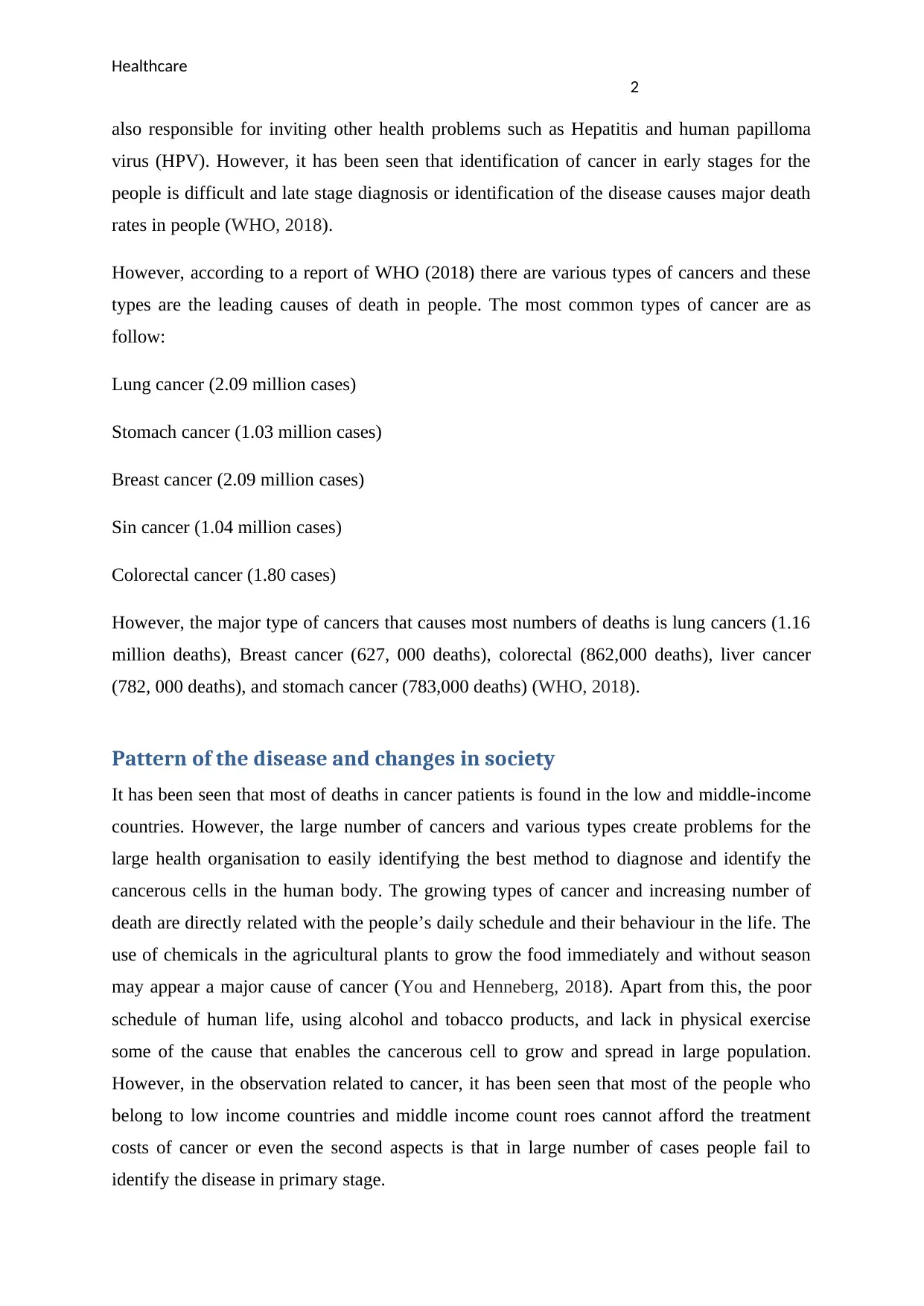
Healthcare
2
also responsible for inviting other health problems such as Hepatitis and human papilloma
virus (HPV). However, it has been seen that identification of cancer in early stages for the
people is difficult and late stage diagnosis or identification of the disease causes major death
rates in people (WHO, 2018).
However, according to a report of WHO (2018) there are various types of cancers and these
types are the leading causes of death in people. The most common types of cancer are as
follow:
Lung cancer (2.09 million cases)
Stomach cancer (1.03 million cases)
Breast cancer (2.09 million cases)
Sin cancer (1.04 million cases)
Colorectal cancer (1.80 cases)
However, the major type of cancers that causes most numbers of deaths is lung cancers (1.16
million deaths), Breast cancer (627, 000 deaths), colorectal (862,000 deaths), liver cancer
(782, 000 deaths), and stomach cancer (783,000 deaths) (WHO, 2018).
Pattern of the disease and changes in society
It has been seen that most of deaths in cancer patients is found in the low and middle-income
countries. However, the large number of cancers and various types create problems for the
large health organisation to easily identifying the best method to diagnose and identify the
cancerous cells in the human body. The growing types of cancer and increasing number of
death are directly related with the people’s daily schedule and their behaviour in the life. The
use of chemicals in the agricultural plants to grow the food immediately and without season
may appear a major cause of cancer (You and Henneberg, 2018). Apart from this, the poor
schedule of human life, using alcohol and tobacco products, and lack in physical exercise
some of the cause that enables the cancerous cell to grow and spread in large population.
However, in the observation related to cancer, it has been seen that most of the people who
belong to low income countries and middle income count roes cannot afford the treatment
costs of cancer or even the second aspects is that in large number of cases people fail to
identify the disease in primary stage.
2
also responsible for inviting other health problems such as Hepatitis and human papilloma
virus (HPV). However, it has been seen that identification of cancer in early stages for the
people is difficult and late stage diagnosis or identification of the disease causes major death
rates in people (WHO, 2018).
However, according to a report of WHO (2018) there are various types of cancers and these
types are the leading causes of death in people. The most common types of cancer are as
follow:
Lung cancer (2.09 million cases)
Stomach cancer (1.03 million cases)
Breast cancer (2.09 million cases)
Sin cancer (1.04 million cases)
Colorectal cancer (1.80 cases)
However, the major type of cancers that causes most numbers of deaths is lung cancers (1.16
million deaths), Breast cancer (627, 000 deaths), colorectal (862,000 deaths), liver cancer
(782, 000 deaths), and stomach cancer (783,000 deaths) (WHO, 2018).
Pattern of the disease and changes in society
It has been seen that most of deaths in cancer patients is found in the low and middle-income
countries. However, the large number of cancers and various types create problems for the
large health organisation to easily identifying the best method to diagnose and identify the
cancerous cells in the human body. The growing types of cancer and increasing number of
death are directly related with the people’s daily schedule and their behaviour in the life. The
use of chemicals in the agricultural plants to grow the food immediately and without season
may appear a major cause of cancer (You and Henneberg, 2018). Apart from this, the poor
schedule of human life, using alcohol and tobacco products, and lack in physical exercise
some of the cause that enables the cancerous cell to grow and spread in large population.
However, in the observation related to cancer, it has been seen that most of the people who
belong to low income countries and middle income count roes cannot afford the treatment
costs of cancer or even the second aspects is that in large number of cases people fail to
identify the disease in primary stage.
⊘ This is a preview!⊘
Do you want full access?
Subscribe today to unlock all pages.

Trusted by 1+ million students worldwide
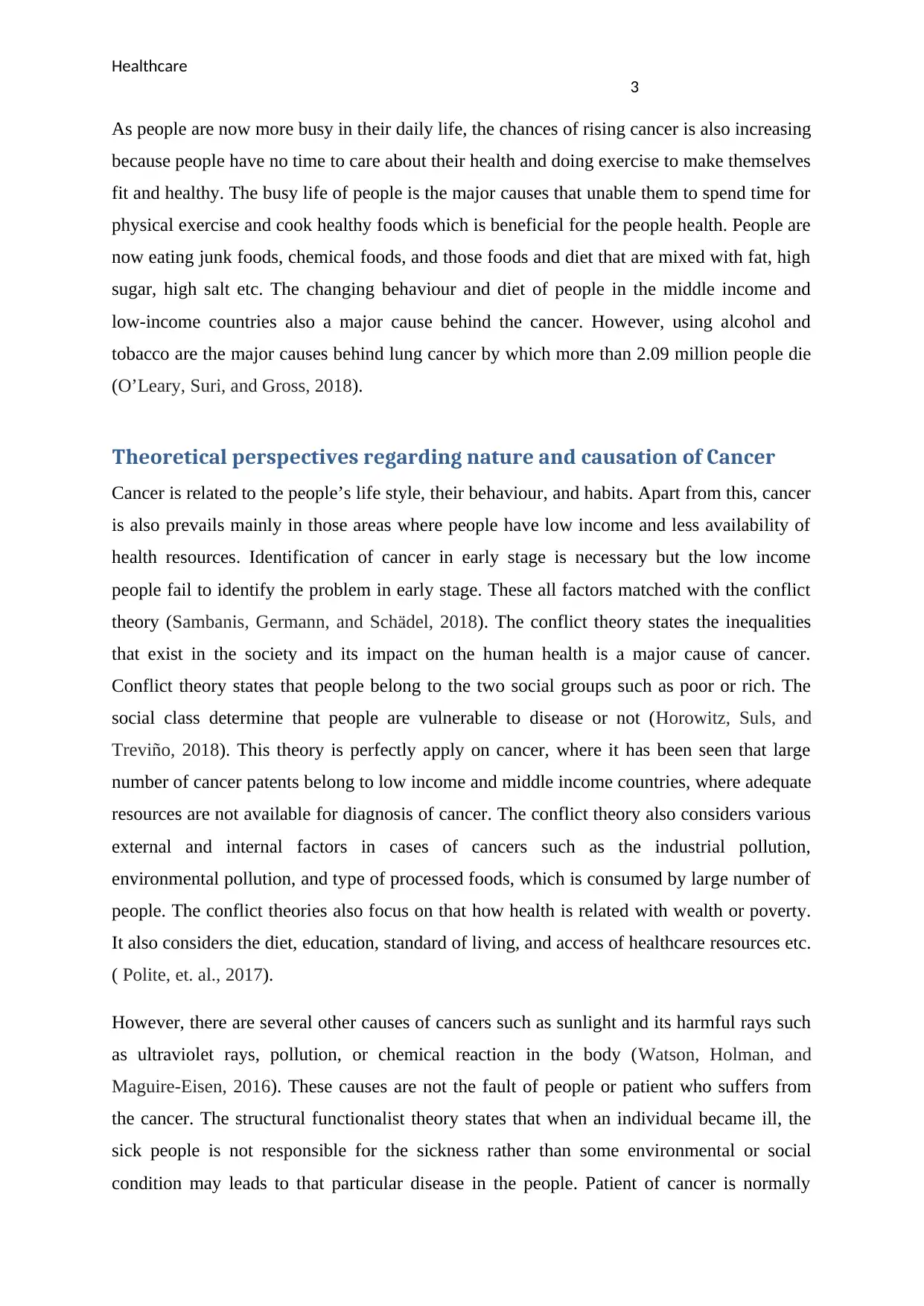
Healthcare
3
As people are now more busy in their daily life, the chances of rising cancer is also increasing
because people have no time to care about their health and doing exercise to make themselves
fit and healthy. The busy life of people is the major causes that unable them to spend time for
physical exercise and cook healthy foods which is beneficial for the people health. People are
now eating junk foods, chemical foods, and those foods and diet that are mixed with fat, high
sugar, high salt etc. The changing behaviour and diet of people in the middle income and
low-income countries also a major cause behind the cancer. However, using alcohol and
tobacco are the major causes behind lung cancer by which more than 2.09 million people die
(O’Leary, Suri, and Gross, 2018).
Theoretical perspectives regarding nature and causation of Cancer
Cancer is related to the people’s life style, their behaviour, and habits. Apart from this, cancer
is also prevails mainly in those areas where people have low income and less availability of
health resources. Identification of cancer in early stage is necessary but the low income
people fail to identify the problem in early stage. These all factors matched with the conflict
theory (Sambanis, Germann, and Schädel, 2018). The conflict theory states the inequalities
that exist in the society and its impact on the human health is a major cause of cancer.
Conflict theory states that people belong to the two social groups such as poor or rich. The
social class determine that people are vulnerable to disease or not (Horowitz, Suls, and
Treviño, 2018). This theory is perfectly apply on cancer, where it has been seen that large
number of cancer patents belong to low income and middle income countries, where adequate
resources are not available for diagnosis of cancer. The conflict theory also considers various
external and internal factors in cases of cancers such as the industrial pollution,
environmental pollution, and type of processed foods, which is consumed by large number of
people. The conflict theories also focus on that how health is related with wealth or poverty.
It also considers the diet, education, standard of living, and access of healthcare resources etc.
( Polite, et. al., 2017).
However, there are several other causes of cancers such as sunlight and its harmful rays such
as ultraviolet rays, pollution, or chemical reaction in the body (Watson, Holman, and
Maguire-Eisen, 2016). These causes are not the fault of people or patient who suffers from
the cancer. The structural functionalist theory states that when an individual became ill, the
sick people is not responsible for the sickness rather than some environmental or social
condition may leads to that particular disease in the people. Patient of cancer is normally
3
As people are now more busy in their daily life, the chances of rising cancer is also increasing
because people have no time to care about their health and doing exercise to make themselves
fit and healthy. The busy life of people is the major causes that unable them to spend time for
physical exercise and cook healthy foods which is beneficial for the people health. People are
now eating junk foods, chemical foods, and those foods and diet that are mixed with fat, high
sugar, high salt etc. The changing behaviour and diet of people in the middle income and
low-income countries also a major cause behind the cancer. However, using alcohol and
tobacco are the major causes behind lung cancer by which more than 2.09 million people die
(O’Leary, Suri, and Gross, 2018).
Theoretical perspectives regarding nature and causation of Cancer
Cancer is related to the people’s life style, their behaviour, and habits. Apart from this, cancer
is also prevails mainly in those areas where people have low income and less availability of
health resources. Identification of cancer in early stage is necessary but the low income
people fail to identify the problem in early stage. These all factors matched with the conflict
theory (Sambanis, Germann, and Schädel, 2018). The conflict theory states the inequalities
that exist in the society and its impact on the human health is a major cause of cancer.
Conflict theory states that people belong to the two social groups such as poor or rich. The
social class determine that people are vulnerable to disease or not (Horowitz, Suls, and
Treviño, 2018). This theory is perfectly apply on cancer, where it has been seen that large
number of cancer patents belong to low income and middle income countries, where adequate
resources are not available for diagnosis of cancer. The conflict theory also considers various
external and internal factors in cases of cancers such as the industrial pollution,
environmental pollution, and type of processed foods, which is consumed by large number of
people. The conflict theories also focus on that how health is related with wealth or poverty.
It also considers the diet, education, standard of living, and access of healthcare resources etc.
( Polite, et. al., 2017).
However, there are several other causes of cancers such as sunlight and its harmful rays such
as ultraviolet rays, pollution, or chemical reaction in the body (Watson, Holman, and
Maguire-Eisen, 2016). These causes are not the fault of people or patient who suffers from
the cancer. The structural functionalist theory states that when an individual became ill, the
sick people is not responsible for the sickness rather than some environmental or social
condition may leads to that particular disease in the people. Patient of cancer is normally
Paraphrase This Document
Need a fresh take? Get an instant paraphrase of this document with our AI Paraphraser
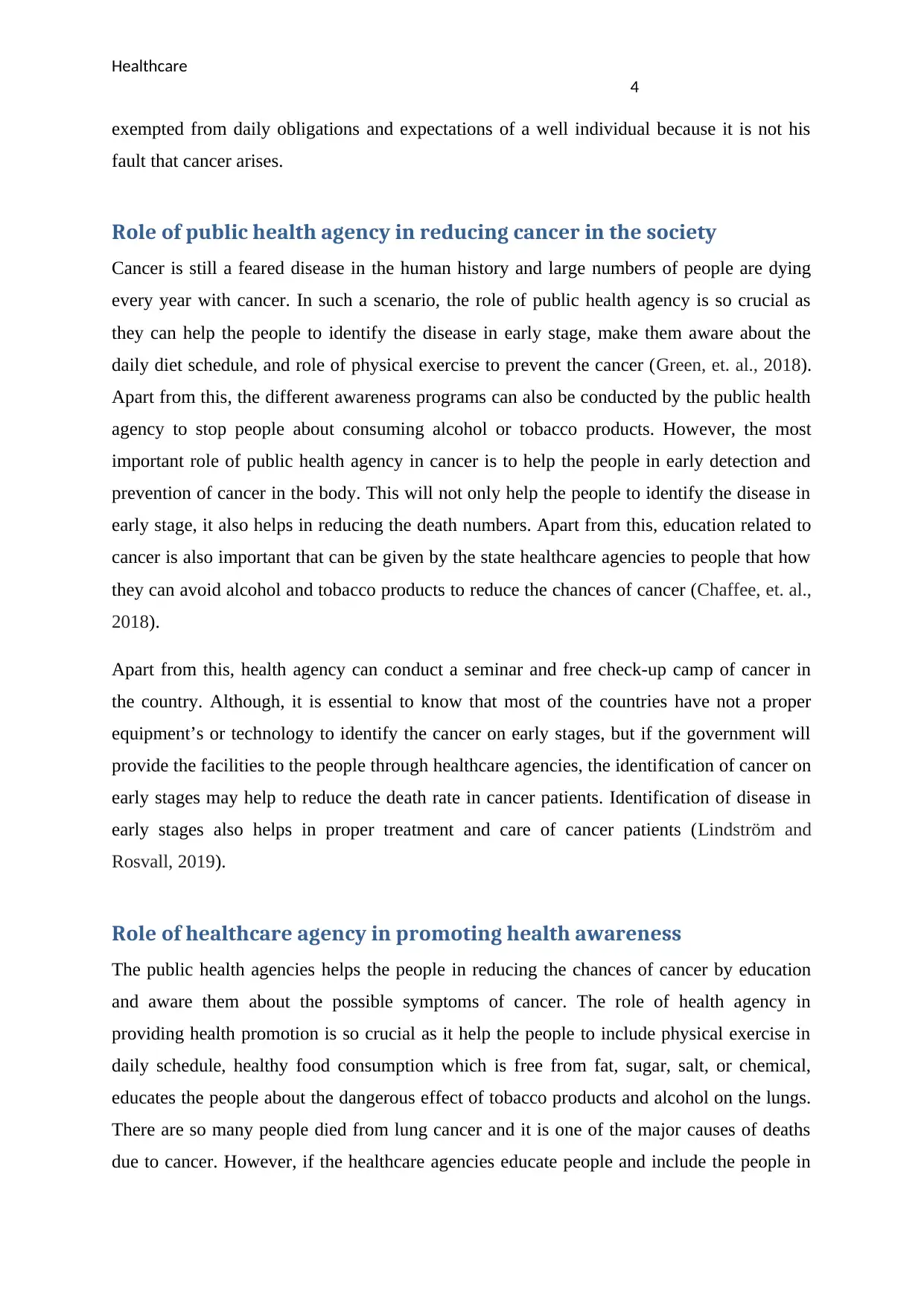
Healthcare
4
exempted from daily obligations and expectations of a well individual because it is not his
fault that cancer arises.
Role of public health agency in reducing cancer in the society
Cancer is still a feared disease in the human history and large numbers of people are dying
every year with cancer. In such a scenario, the role of public health agency is so crucial as
they can help the people to identify the disease in early stage, make them aware about the
daily diet schedule, and role of physical exercise to prevent the cancer (Green, et. al., 2018).
Apart from this, the different awareness programs can also be conducted by the public health
agency to stop people about consuming alcohol or tobacco products. However, the most
important role of public health agency in cancer is to help the people in early detection and
prevention of cancer in the body. This will not only help the people to identify the disease in
early stage, it also helps in reducing the death numbers. Apart from this, education related to
cancer is also important that can be given by the state healthcare agencies to people that how
they can avoid alcohol and tobacco products to reduce the chances of cancer (Chaffee, et. al.,
2018).
Apart from this, health agency can conduct a seminar and free check-up camp of cancer in
the country. Although, it is essential to know that most of the countries have not a proper
equipment’s or technology to identify the cancer on early stages, but if the government will
provide the facilities to the people through healthcare agencies, the identification of cancer on
early stages may help to reduce the death rate in cancer patients. Identification of disease in
early stages also helps in proper treatment and care of cancer patients (Lindström and
Rosvall, 2019).
Role of healthcare agency in promoting health awareness
The public health agencies helps the people in reducing the chances of cancer by education
and aware them about the possible symptoms of cancer. The role of health agency in
providing health promotion is so crucial as it help the people to include physical exercise in
daily schedule, healthy food consumption which is free from fat, sugar, salt, or chemical,
educates the people about the dangerous effect of tobacco products and alcohol on the lungs.
There are so many people died from lung cancer and it is one of the major causes of deaths
due to cancer. However, if the healthcare agencies educate people and include the people in
4
exempted from daily obligations and expectations of a well individual because it is not his
fault that cancer arises.
Role of public health agency in reducing cancer in the society
Cancer is still a feared disease in the human history and large numbers of people are dying
every year with cancer. In such a scenario, the role of public health agency is so crucial as
they can help the people to identify the disease in early stage, make them aware about the
daily diet schedule, and role of physical exercise to prevent the cancer (Green, et. al., 2018).
Apart from this, the different awareness programs can also be conducted by the public health
agency to stop people about consuming alcohol or tobacco products. However, the most
important role of public health agency in cancer is to help the people in early detection and
prevention of cancer in the body. This will not only help the people to identify the disease in
early stage, it also helps in reducing the death numbers. Apart from this, education related to
cancer is also important that can be given by the state healthcare agencies to people that how
they can avoid alcohol and tobacco products to reduce the chances of cancer (Chaffee, et. al.,
2018).
Apart from this, health agency can conduct a seminar and free check-up camp of cancer in
the country. Although, it is essential to know that most of the countries have not a proper
equipment’s or technology to identify the cancer on early stages, but if the government will
provide the facilities to the people through healthcare agencies, the identification of cancer on
early stages may help to reduce the death rate in cancer patients. Identification of disease in
early stages also helps in proper treatment and care of cancer patients (Lindström and
Rosvall, 2019).
Role of healthcare agency in promoting health awareness
The public health agencies helps the people in reducing the chances of cancer by education
and aware them about the possible symptoms of cancer. The role of health agency in
providing health promotion is so crucial as it help the people to include physical exercise in
daily schedule, healthy food consumption which is free from fat, sugar, salt, or chemical,
educates the people about the dangerous effect of tobacco products and alcohol on the lungs.
There are so many people died from lung cancer and it is one of the major causes of deaths
due to cancer. However, if the healthcare agencies educate people and include the people in
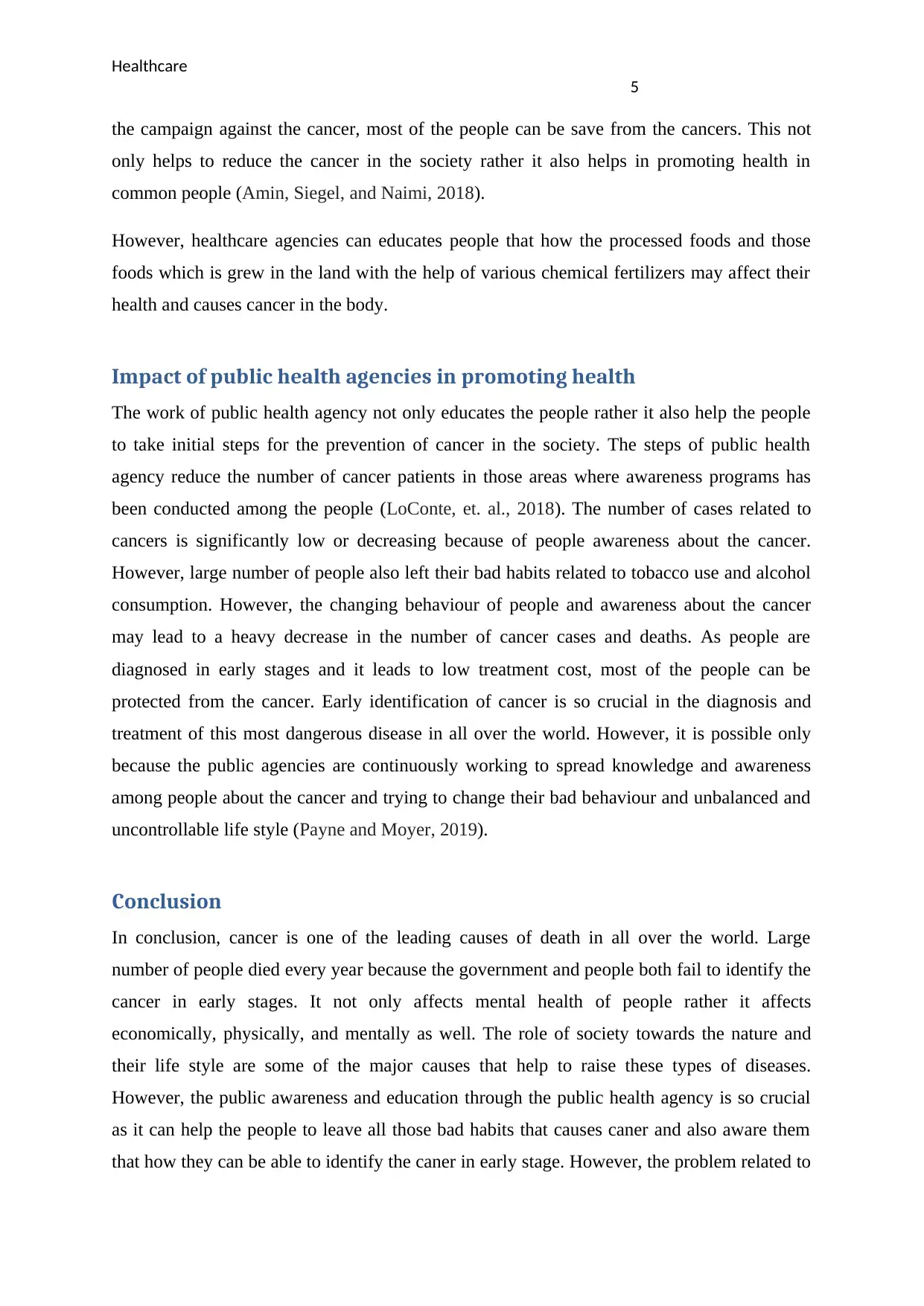
Healthcare
5
the campaign against the cancer, most of the people can be save from the cancers. This not
only helps to reduce the cancer in the society rather it also helps in promoting health in
common people (Amin, Siegel, and Naimi, 2018).
However, healthcare agencies can educates people that how the processed foods and those
foods which is grew in the land with the help of various chemical fertilizers may affect their
health and causes cancer in the body.
Impact of public health agencies in promoting health
The work of public health agency not only educates the people rather it also help the people
to take initial steps for the prevention of cancer in the society. The steps of public health
agency reduce the number of cancer patients in those areas where awareness programs has
been conducted among the people (LoConte, et. al., 2018). The number of cases related to
cancers is significantly low or decreasing because of people awareness about the cancer.
However, large number of people also left their bad habits related to tobacco use and alcohol
consumption. However, the changing behaviour of people and awareness about the cancer
may lead to a heavy decrease in the number of cancer cases and deaths. As people are
diagnosed in early stages and it leads to low treatment cost, most of the people can be
protected from the cancer. Early identification of cancer is so crucial in the diagnosis and
treatment of this most dangerous disease in all over the world. However, it is possible only
because the public agencies are continuously working to spread knowledge and awareness
among people about the cancer and trying to change their bad behaviour and unbalanced and
uncontrollable life style (Payne and Moyer, 2019).
Conclusion
In conclusion, cancer is one of the leading causes of death in all over the world. Large
number of people died every year because the government and people both fail to identify the
cancer in early stages. It not only affects mental health of people rather it affects
economically, physically, and mentally as well. The role of society towards the nature and
their life style are some of the major causes that help to raise these types of diseases.
However, the public awareness and education through the public health agency is so crucial
as it can help the people to leave all those bad habits that causes caner and also aware them
that how they can be able to identify the caner in early stage. However, the problem related to
5
the campaign against the cancer, most of the people can be save from the cancers. This not
only helps to reduce the cancer in the society rather it also helps in promoting health in
common people (Amin, Siegel, and Naimi, 2018).
However, healthcare agencies can educates people that how the processed foods and those
foods which is grew in the land with the help of various chemical fertilizers may affect their
health and causes cancer in the body.
Impact of public health agencies in promoting health
The work of public health agency not only educates the people rather it also help the people
to take initial steps for the prevention of cancer in the society. The steps of public health
agency reduce the number of cancer patients in those areas where awareness programs has
been conducted among the people (LoConte, et. al., 2018). The number of cases related to
cancers is significantly low or decreasing because of people awareness about the cancer.
However, large number of people also left their bad habits related to tobacco use and alcohol
consumption. However, the changing behaviour of people and awareness about the cancer
may lead to a heavy decrease in the number of cancer cases and deaths. As people are
diagnosed in early stages and it leads to low treatment cost, most of the people can be
protected from the cancer. Early identification of cancer is so crucial in the diagnosis and
treatment of this most dangerous disease in all over the world. However, it is possible only
because the public agencies are continuously working to spread knowledge and awareness
among people about the cancer and trying to change their bad behaviour and unbalanced and
uncontrollable life style (Payne and Moyer, 2019).
Conclusion
In conclusion, cancer is one of the leading causes of death in all over the world. Large
number of people died every year because the government and people both fail to identify the
cancer in early stages. It not only affects mental health of people rather it affects
economically, physically, and mentally as well. The role of society towards the nature and
their life style are some of the major causes that help to raise these types of diseases.
However, the public awareness and education through the public health agency is so crucial
as it can help the people to leave all those bad habits that causes caner and also aware them
that how they can be able to identify the caner in early stage. However, the problem related to
⊘ This is a preview!⊘
Do you want full access?
Subscribe today to unlock all pages.

Trusted by 1+ million students worldwide
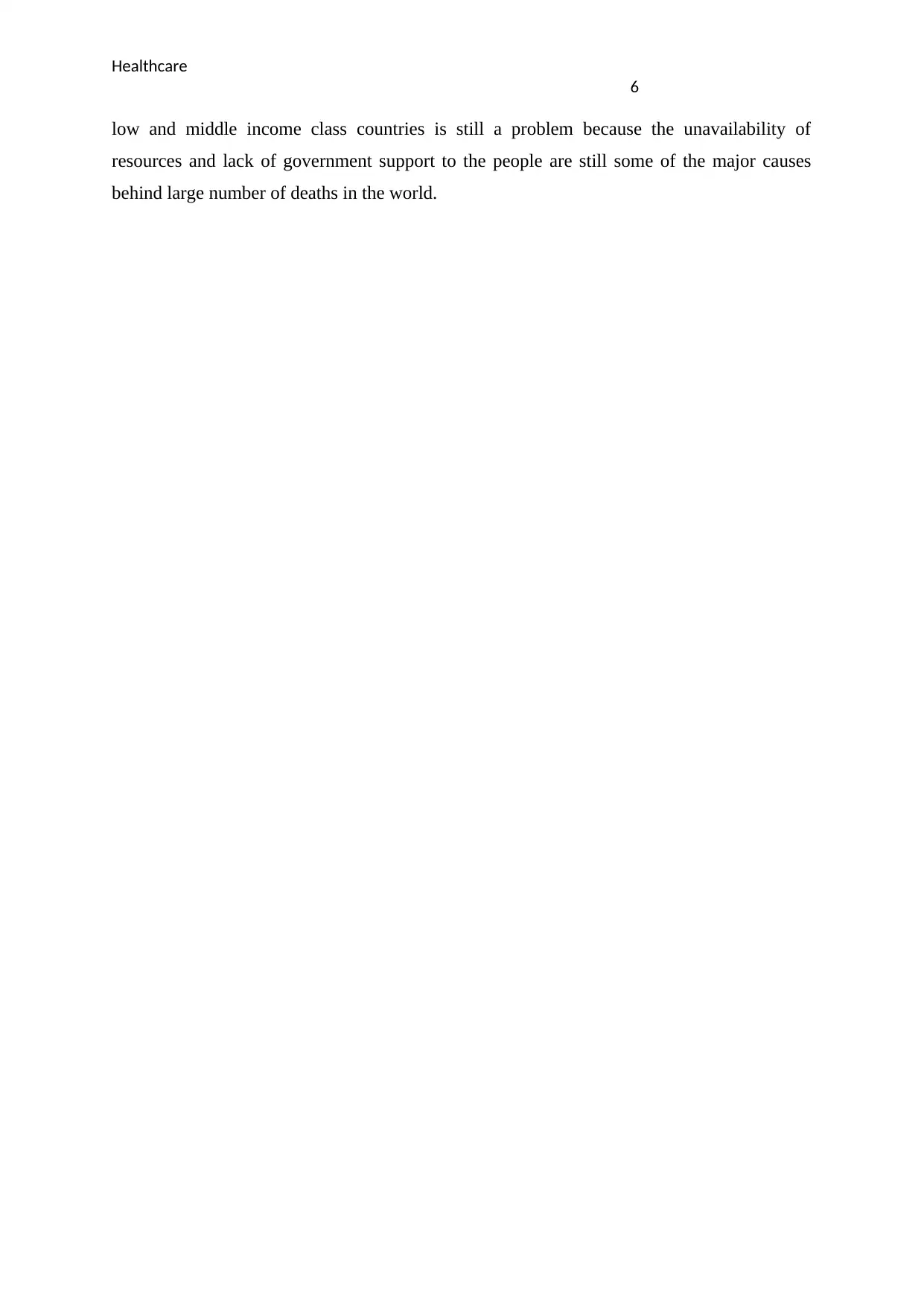
Healthcare
6
low and middle income class countries is still a problem because the unavailability of
resources and lack of government support to the people are still some of the major causes
behind large number of deaths in the world.
6
low and middle income class countries is still a problem because the unavailability of
resources and lack of government support to the people are still some of the major causes
behind large number of deaths in the world.
Paraphrase This Document
Need a fresh take? Get an instant paraphrase of this document with our AI Paraphraser
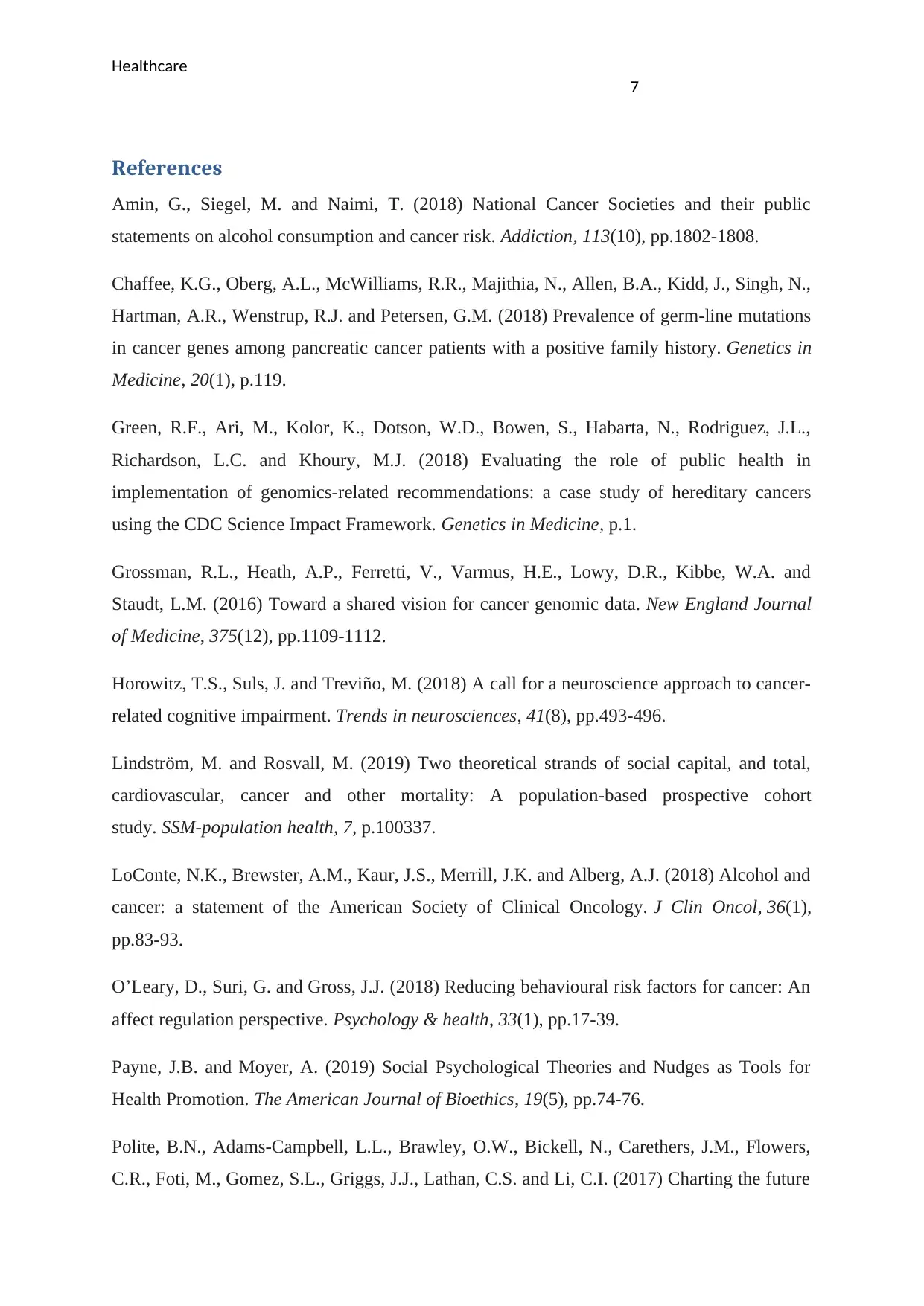
Healthcare
7
References
Amin, G., Siegel, M. and Naimi, T. (2018) National Cancer Societies and their public
statements on alcohol consumption and cancer risk. Addiction, 113(10), pp.1802-1808.
Chaffee, K.G., Oberg, A.L., McWilliams, R.R., Majithia, N., Allen, B.A., Kidd, J., Singh, N.,
Hartman, A.R., Wenstrup, R.J. and Petersen, G.M. (2018) Prevalence of germ-line mutations
in cancer genes among pancreatic cancer patients with a positive family history. Genetics in
Medicine, 20(1), p.119.
Green, R.F., Ari, M., Kolor, K., Dotson, W.D., Bowen, S., Habarta, N., Rodriguez, J.L.,
Richardson, L.C. and Khoury, M.J. (2018) Evaluating the role of public health in
implementation of genomics-related recommendations: a case study of hereditary cancers
using the CDC Science Impact Framework. Genetics in Medicine, p.1.
Grossman, R.L., Heath, A.P., Ferretti, V., Varmus, H.E., Lowy, D.R., Kibbe, W.A. and
Staudt, L.M. (2016) Toward a shared vision for cancer genomic data. New England Journal
of Medicine, 375(12), pp.1109-1112.
Horowitz, T.S., Suls, J. and Treviño, M. (2018) A call for a neuroscience approach to cancer-
related cognitive impairment. Trends in neurosciences, 41(8), pp.493-496.
Lindström, M. and Rosvall, M. (2019) Two theoretical strands of social capital, and total,
cardiovascular, cancer and other mortality: A population-based prospective cohort
study. SSM-population health, 7, p.100337.
LoConte, N.K., Brewster, A.M., Kaur, J.S., Merrill, J.K. and Alberg, A.J. (2018) Alcohol and
cancer: a statement of the American Society of Clinical Oncology. J Clin Oncol, 36(1),
pp.83-93.
O’Leary, D., Suri, G. and Gross, J.J. (2018) Reducing behavioural risk factors for cancer: An
affect regulation perspective. Psychology & health, 33(1), pp.17-39.
Payne, J.B. and Moyer, A. (2019) Social Psychological Theories and Nudges as Tools for
Health Promotion. The American Journal of Bioethics, 19(5), pp.74-76.
Polite, B.N., Adams-Campbell, L.L., Brawley, O.W., Bickell, N., Carethers, J.M., Flowers,
C.R., Foti, M., Gomez, S.L., Griggs, J.J., Lathan, C.S. and Li, C.I. (2017) Charting the future
7
References
Amin, G., Siegel, M. and Naimi, T. (2018) National Cancer Societies and their public
statements on alcohol consumption and cancer risk. Addiction, 113(10), pp.1802-1808.
Chaffee, K.G., Oberg, A.L., McWilliams, R.R., Majithia, N., Allen, B.A., Kidd, J., Singh, N.,
Hartman, A.R., Wenstrup, R.J. and Petersen, G.M. (2018) Prevalence of germ-line mutations
in cancer genes among pancreatic cancer patients with a positive family history. Genetics in
Medicine, 20(1), p.119.
Green, R.F., Ari, M., Kolor, K., Dotson, W.D., Bowen, S., Habarta, N., Rodriguez, J.L.,
Richardson, L.C. and Khoury, M.J. (2018) Evaluating the role of public health in
implementation of genomics-related recommendations: a case study of hereditary cancers
using the CDC Science Impact Framework. Genetics in Medicine, p.1.
Grossman, R.L., Heath, A.P., Ferretti, V., Varmus, H.E., Lowy, D.R., Kibbe, W.A. and
Staudt, L.M. (2016) Toward a shared vision for cancer genomic data. New England Journal
of Medicine, 375(12), pp.1109-1112.
Horowitz, T.S., Suls, J. and Treviño, M. (2018) A call for a neuroscience approach to cancer-
related cognitive impairment. Trends in neurosciences, 41(8), pp.493-496.
Lindström, M. and Rosvall, M. (2019) Two theoretical strands of social capital, and total,
cardiovascular, cancer and other mortality: A population-based prospective cohort
study. SSM-population health, 7, p.100337.
LoConte, N.K., Brewster, A.M., Kaur, J.S., Merrill, J.K. and Alberg, A.J. (2018) Alcohol and
cancer: a statement of the American Society of Clinical Oncology. J Clin Oncol, 36(1),
pp.83-93.
O’Leary, D., Suri, G. and Gross, J.J. (2018) Reducing behavioural risk factors for cancer: An
affect regulation perspective. Psychology & health, 33(1), pp.17-39.
Payne, J.B. and Moyer, A. (2019) Social Psychological Theories and Nudges as Tools for
Health Promotion. The American Journal of Bioethics, 19(5), pp.74-76.
Polite, B.N., Adams-Campbell, L.L., Brawley, O.W., Bickell, N., Carethers, J.M., Flowers,
C.R., Foti, M., Gomez, S.L., Griggs, J.J., Lathan, C.S. and Li, C.I. (2017) Charting the future
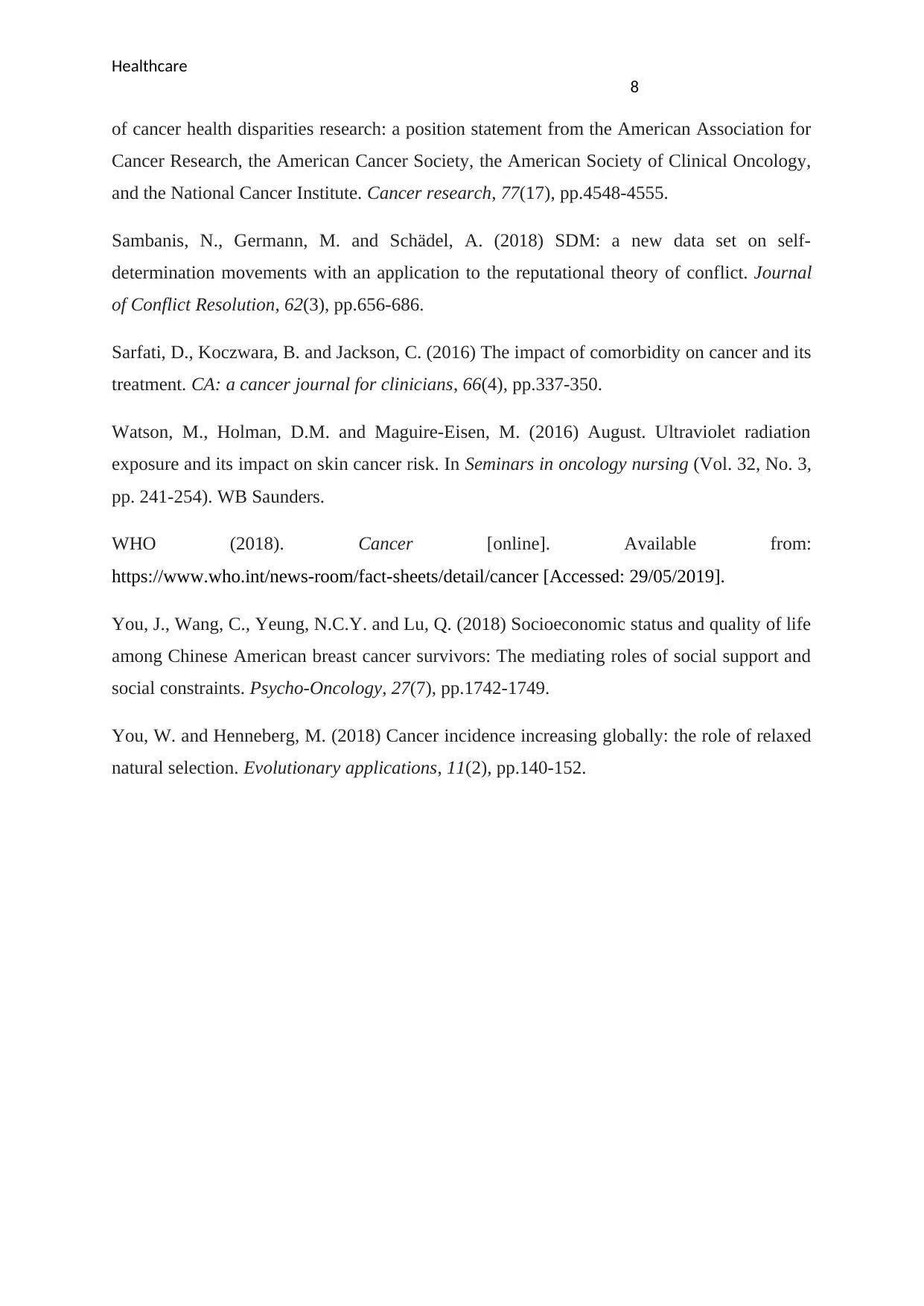
Healthcare
8
of cancer health disparities research: a position statement from the American Association for
Cancer Research, the American Cancer Society, the American Society of Clinical Oncology,
and the National Cancer Institute. Cancer research, 77(17), pp.4548-4555.
Sambanis, N., Germann, M. and Schädel, A. (2018) SDM: a new data set on self-
determination movements with an application to the reputational theory of conflict. Journal
of Conflict Resolution, 62(3), pp.656-686.
Sarfati, D., Koczwara, B. and Jackson, C. (2016) The impact of comorbidity on cancer and its
treatment. CA: a cancer journal for clinicians, 66(4), pp.337-350.
Watson, M., Holman, D.M. and Maguire-Eisen, M. (2016) August. Ultraviolet radiation
exposure and its impact on skin cancer risk. In Seminars in oncology nursing (Vol. 32, No. 3,
pp. 241-254). WB Saunders.
WHO (2018). Cancer [online]. Available from:
https://www.who.int/news-room/fact-sheets/detail/cancer [Accessed: 29/05/2019].
You, J., Wang, C., Yeung, N.C.Y. and Lu, Q. (2018) Socioeconomic status and quality of life
among Chinese American breast cancer survivors: The mediating roles of social support and
social constraints. Psycho‐Oncology, 27(7), pp.1742-1749.
You, W. and Henneberg, M. (2018) Cancer incidence increasing globally: the role of relaxed
natural selection. Evolutionary applications, 11(2), pp.140-152.
8
of cancer health disparities research: a position statement from the American Association for
Cancer Research, the American Cancer Society, the American Society of Clinical Oncology,
and the National Cancer Institute. Cancer research, 77(17), pp.4548-4555.
Sambanis, N., Germann, M. and Schädel, A. (2018) SDM: a new data set on self-
determination movements with an application to the reputational theory of conflict. Journal
of Conflict Resolution, 62(3), pp.656-686.
Sarfati, D., Koczwara, B. and Jackson, C. (2016) The impact of comorbidity on cancer and its
treatment. CA: a cancer journal for clinicians, 66(4), pp.337-350.
Watson, M., Holman, D.M. and Maguire-Eisen, M. (2016) August. Ultraviolet radiation
exposure and its impact on skin cancer risk. In Seminars in oncology nursing (Vol. 32, No. 3,
pp. 241-254). WB Saunders.
WHO (2018). Cancer [online]. Available from:
https://www.who.int/news-room/fact-sheets/detail/cancer [Accessed: 29/05/2019].
You, J., Wang, C., Yeung, N.C.Y. and Lu, Q. (2018) Socioeconomic status and quality of life
among Chinese American breast cancer survivors: The mediating roles of social support and
social constraints. Psycho‐Oncology, 27(7), pp.1742-1749.
You, W. and Henneberg, M. (2018) Cancer incidence increasing globally: the role of relaxed
natural selection. Evolutionary applications, 11(2), pp.140-152.
⊘ This is a preview!⊘
Do you want full access?
Subscribe today to unlock all pages.

Trusted by 1+ million students worldwide
1 out of 9
Related Documents
Your All-in-One AI-Powered Toolkit for Academic Success.
+13062052269
info@desklib.com
Available 24*7 on WhatsApp / Email
![[object Object]](/_next/static/media/star-bottom.7253800d.svg)
Unlock your academic potential
Copyright © 2020–2026 A2Z Services. All Rights Reserved. Developed and managed by ZUCOL.





